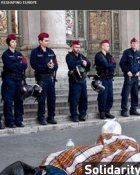Even though all parties called for European solidarity, they were at odds about its concrete meaning.
Now that the urgency of the challenges stemming from the sudden dynamics and sheer size of migration into the EU has made the refugee crisis the dominant topic of the political agenda (notwithstanding the fact that the euro crisis remains far from being resolved), the rifts between member states seem to have deepened and threaten to impair their interaction in the long-run. The polemic and relentless way in which member states have shifted the blame on each other and held on to their narrowly defined national interests – in the case of some Central Eastern European (CEE) countries like Hungary or Slovakia also by putting forward identity-based arguments – represent an explosive danger for EU cohesion and thus also for the EU’s capacity to act.
Once again, EU leaders call for solidarity: This time, not only member states that for years have found themselves alone in dealing with the pressure of irregular migration due to their geographical location like Greece and Italy raise their voice for a fairer European wide solution. Also Germany – suddenly confronted with the large majority of refugees arriving each day via the Western Balkan route – has discovered a hasty interest in reminding its European partners to step up to their responsibility of a fairer burden sharing within the EU: “A rejection [of taking refugees in] as a matter of principle – that is – excuse me for being that blunt – that’s a danger for Europe,” Angela Merkel was quoted referring to the reluctance of some EU member states to accept a binding quota system for refugees thus leaving member states in need in the cold.
At the same time, particularly CEE countries blame Berlin for its lack of solidarity and responsibility towards its European partners: In their view, it was Berlin’s unilateral decision of suspending the application of the Dublin regulation for Syrian refugees that caused a massive pull-effect in the first place and attracted even more refugees to come to the EU and primarily to Germany. “It is not a European, but a German problem,” the Hungarian Prime Minister Victor Orbán pointed out recently. Germany’s response to the refugee crisis is not only seen as a short-sighted and thoughtless reception policy. CEE countries feel that Berlin has ignored European rules. Now Berlin is trying to force them into a Europeanized migration system along the lines of German moral and financial standards.
This harsh criticism mainly from CEE countries but also from other European member states bears the potential to challenge Germany’s leadership role within the EU in the future. For many years, Germany was taking the lead on Europe’s most pressing challenges such as handling negotiations on the eurozone crisis or Russia’s threat to European security. Ever since, Chancellor Merkel’s influence on other member states and outside the EU grew stronger and stronger.
However, this time it seems to be different: despite calls for solidarity and measures to exercise pressure on CEE countries (i.e. the German decision to temporarily re-introduce border controls) Merkel has been widely unable to convince other European capitals to follow her lead. Instead, her dependence on European partners is increasing with every day that the inflow of migrants to Germany does not abate and criticism of her migration policies becomes more prominent in the German public debate.
After an initial phase of the refugee crisis in which Germans celebrated their Willkommenskultur, public opinion is increasingly changing: alongside voices from alarmed local authorities claiming that their reception capacity has been exceeded, Germans are increasingly questioning whether the newcomers can be successfully integrated in the medium-term. Merkel’s approval rates and the polling results of her Christian Democratic Party (CDU) have dropped strongly in the past weeks hinting towards a direct link between her willingness to welcome refugees on the one hand and her popularity and support for her party on the other. This is accompanied by an increasing number of critics of Merkel’s migration policies. To the right of the CDU, the Eurosceptic Alternative für Deutschland (AfD) is celebrating an unexpected comeback in voters’ support due to its harsh stance on migration while increasing criticism within her own party is posing another blow to her inner-party authority after the tensions over the third bailout for Greece.
Only a swift and comprehensive European solution will allow Merkel, to win the argument within her party, against her critics and in the wider public opinion. For this, she will need all member states to cooperate. Therefore, the German government should engage with CEE countries as quickly as possible in order to identify common ground and persuade them –also by providing support and incentives – to cooperate on the European level.
A first step for rapprochement was the mini-summit with leaders of countries along the Western Balkans route. However, the split between EU member states persists. Not all member states seem to have realized yet that a joint European solution can be the only adequate response to such a trans-boundary challenge. Yet, it should have become clear by now that all attempts by single member states to deal with the refugee crisis unilaterally i.e. by shutting down their borders worsens the European chaos as it will immediately affect the others. This is why solidarity in such a crisis situation should not simply be driven by pure generosity or altruistic motivations but should be in the self-interest of every member state. Therefore, member states should refrain from pretending not to be affected and step up to their collective European responsibility by overcoming the current deadlock and reverting to its founding values – not least for the stability of the European project.
Warnings about the implications for European integration in case European leaders fail to provide a comprehensive solution to the refugee crisis are justified. A growingly divided EU that closes its borders and fails to live up to its responsibilities will also not be able to face up to the huge security and social challenges of the next decades. Thus, the refugee crisis is likely to be a make-or-break moment for European integration, which will determine the future shape of the Union in the long-run.
This piece was originally published in the Heinrich Boell Foundation's Reshaping Europe blog.

